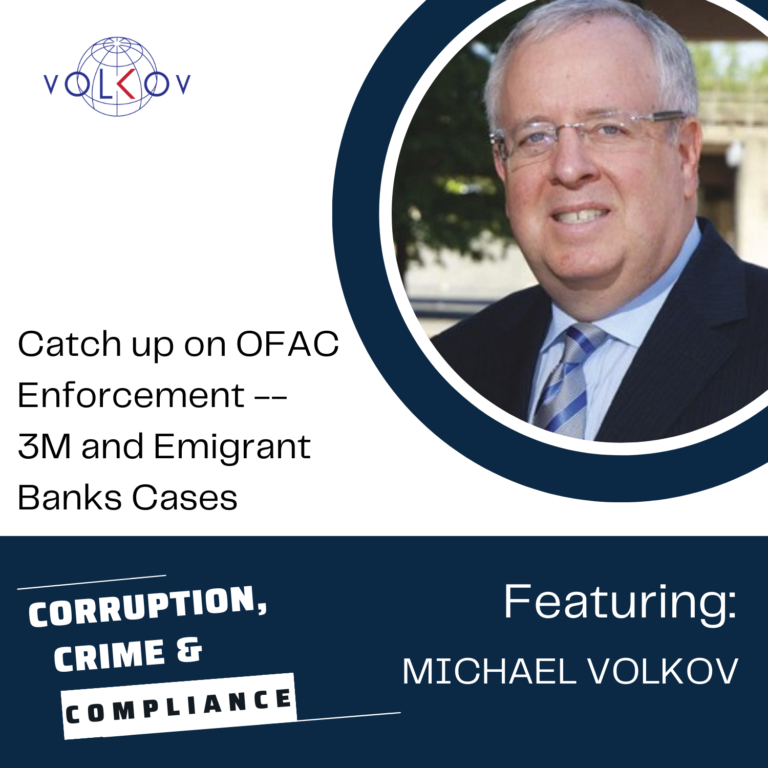3M faced a dual settlement, first with the SEC and then with OFAC, over alleged Iranian sanctions violations stemming from misconceptions and oversights in a license plate deal with a German intermediary. Despite the gravity of the case, 3M took proactive remedial actions, including voluntary disclosure and internal changes. Similarly, Emigrant Bank maintained a CD account for two Iranian residents for over two decades without proper screening, leading to a $31,000 settlement. In this episode of Corruption, Crime, and Compliance, Michael Volkov shares details of both cases, underscoring the complexities of navigating sanctions regulations, the consequences of compliance failures, and the pivotal role of voluntary disclosure and proactive remediation in mitigating penalties.
You’ll hear Michael talk about:
- 3M settled with the Securities and Exchange Commission (SEC) for $6.5 million and the Office of Foreign Assets Control (OFAC) for $9.6 million over alleged violations of Iranian sanctions. 3M’s Dubai-based subsidiary entered a deal to manufacture reflective license plate sheeting for a German company. Still, it misunderstood the end user, believing it was a reseller when it was Iran.
- Between 2016 and 2018, 3M sent 43 shipments to the German intermediary, who resold them to Iran, violating OFAC regulations. This led to 54 violations of the Iran sanctions program. 3M’s compliance team approved the deal without realizing the end-user was in Iran. Suggestions to review the agreement were ignored, and steps were taken to conceal its true nature.
- 3M took remedial steps, including voluntary disclosure, termination or discipline of involved employees, leadership changes, revamped sanctions compliance training, and discontinuation of business with the German reseller.
- In another case, Emigrant Bank maintained a certificate of deposit (CD) account for two Iranian residents from 1995 until 2021 without properly screening it for sanctions issues. In 2016, when the account holders requested a wire transfer, Emigrant became aware of potential sanctions issues but still approved the transfer.
- In 2019, Emigrant’s upgraded screening software flagged the account, but the compliance team overrode the alert based on erroneous guidance from the 2016 wire transfer. Emigrant recognized the account’s status in 2021, closed it, and took steps to remediate compliance program shortcomings.
- Emigrant settled the matter for $31,000, significantly lower than the maximum penalty applicable ($9.9 million), with voluntary disclosure and proactive remediation efforts considered mitigating factors by OFAC.
KEY QUOTES
“In setting up this agreement, numerous managers at 3M suggested that trade compliance reviewed the deal. But these 60 suggestions were ignored by the deal’s proponents. Even worse, a 3M subsidiary received an outside due diligence report, flagging the connection to Iranian law enforcement, and closed the matter without further investigation.” – Michael Volkov
“On September 21 of this year, OFAC announced that Emigrant agreed to pay $31,867 to resolve 30 violations of the Iran Sanctions Program. The violations all relate to a single CD account that Emigrant maintained for two Iranian residents from 1995 until it closed the account in 2021.” – Michael Volkov
“In 2019, Emigrant upgraded its screening software, sanctioned screening, and the new program flagged the account as problematic due to the account holder’s Iranian residency. However, the software is only effective as its operator. Upon review, Emigrant’s compliance team overrode the alert based on erroneous guidance from the 2016 wire transfer. Now, Emigrant finally recognized the account status in 2021 and took steps to remediate its compliance program shortcomings.” – Michael Volkov
Resources






